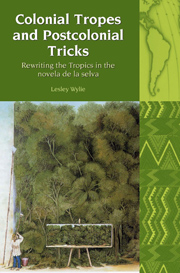Book contents
- Frontmatter
- Contents
- Acknowledgements
- Introduction
- 1 Colonial Tropes and Postcolonial Tricks
- 2 Tropical Nature and Landscape Aesthetics
- 3 Salvaging the Savage
- 4 Paradise Lost: Wilderness and the Limits of Western Escapism
- 5 Jungle Fever: Degeneration as a Trop[olog]ical Disease
- Conclusion
- Bibliography
- Index
5 - Jungle Fever: Degeneration as a Trop[olog]ical Disease
- Frontmatter
- Contents
- Acknowledgements
- Introduction
- 1 Colonial Tropes and Postcolonial Tricks
- 2 Tropical Nature and Landscape Aesthetics
- 3 Salvaging the Savage
- 4 Paradise Lost: Wilderness and the Limits of Western Escapism
- 5 Jungle Fever: Degeneration as a Trop[olog]ical Disease
- Conclusion
- Bibliography
- Index
Summary
It was the jungle, the endless, all-embracing, fearful jungle, that overwhelmed my mind. No shipwrecked mariner driven to madness by long tossing on a raft at sea ever conceived such hatred and horror of his surroundings as that which now came upon me for the fresh, perpetual, monotonous green of the interminable forest.
F. W. Up de Graff, Head Hunters of the AmazonIn the introduction to his 1845 biography, Facundo, Domingo Sarmiento characterized the future of Argentina as ‘una lucha […] entre los últimos progresos del espíritu humano y los rudimentos de la vida salvaje, entre las ciudades populosas y los bosques sombríos’. This view of South America as an epic struggle between civilization and barbarism – a barbarism which finds its fullest expression in ‘los bosques sombríos’ – reinvigorated a motif that can be traced from the very beginnings of Spanish-American literature in the early modern chronicle, which regarded the Spanish colonization of the New World as a battle between culture and nature, Christianity and paganism. It also anticipated a debate which was to reach fruition in the late nineteenth and early twentieth centuries regarding Latin America's destiny as a ‘continente enfermo’ (the title of a 1899 pamphlet by the Venezuelan César Zumeta) – a land enervated by its ‘unhealthy’ ethnic and telluric make-up. This debate often focused on climate, particularly on the influence of the tropics on health and national prosperity.
- Type
- Chapter
- Information
- Colonial Tropes and Postcolonial TricksRewriting the Tropics in the novela de la selva, pp. 122 - 146Publisher: Liverpool University PressPrint publication year: 2009



